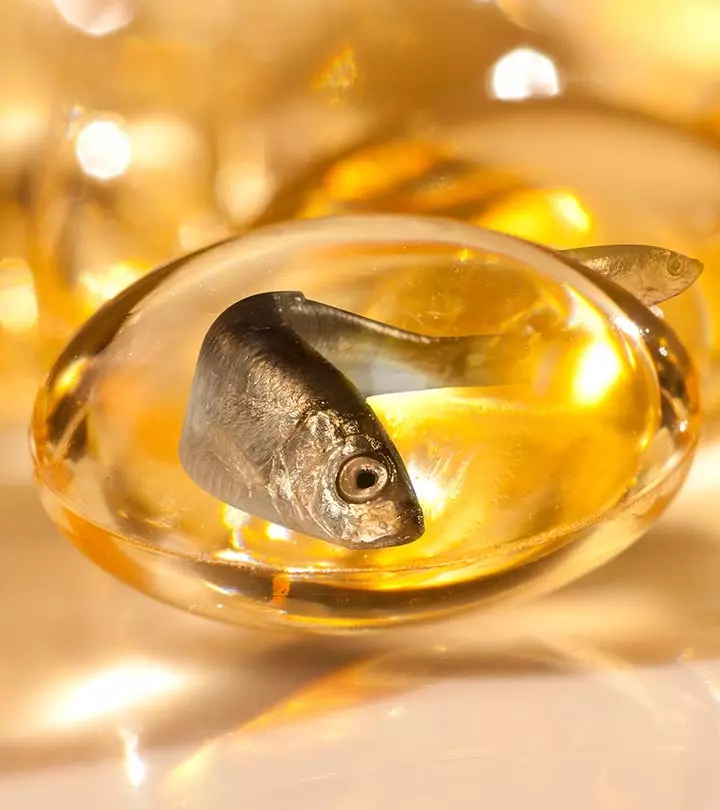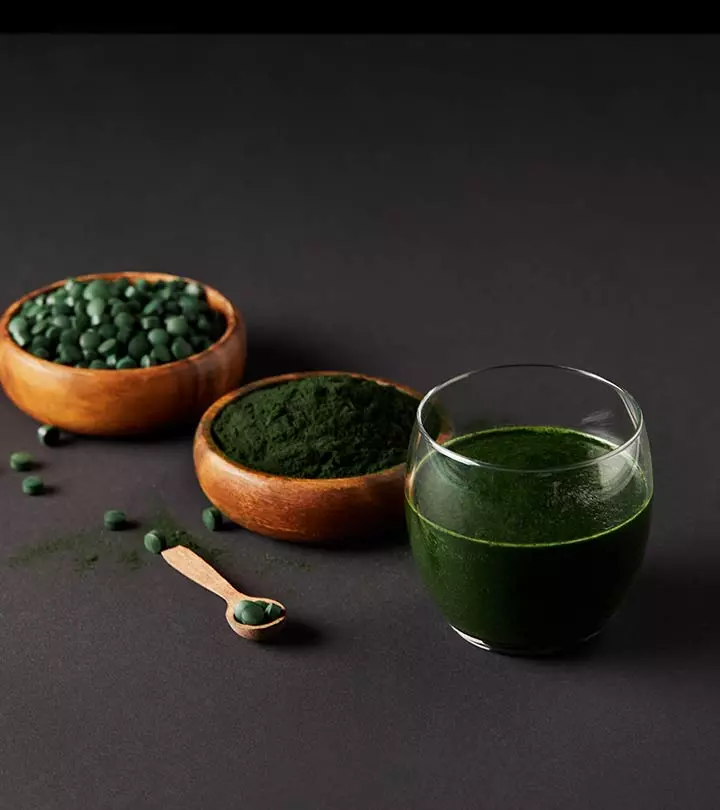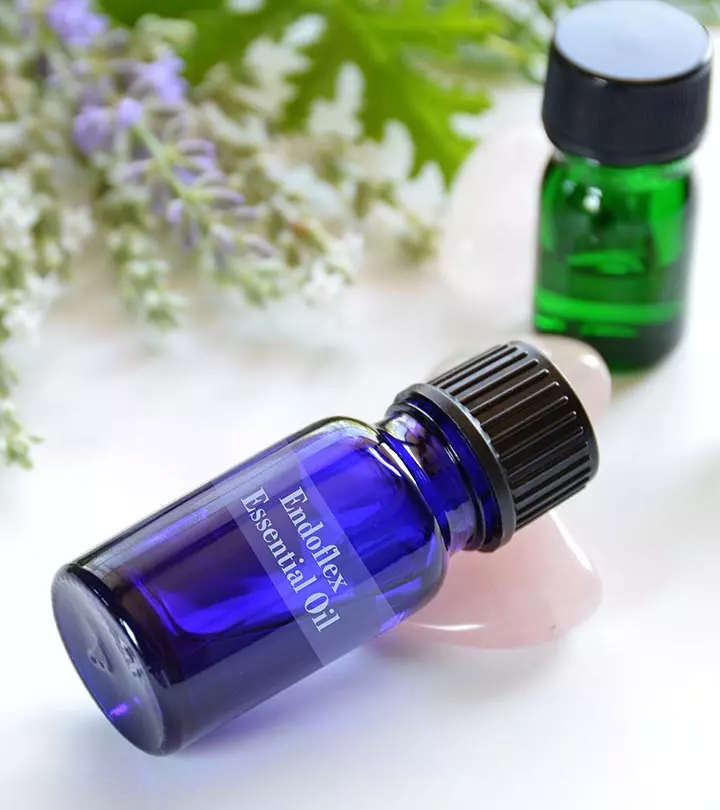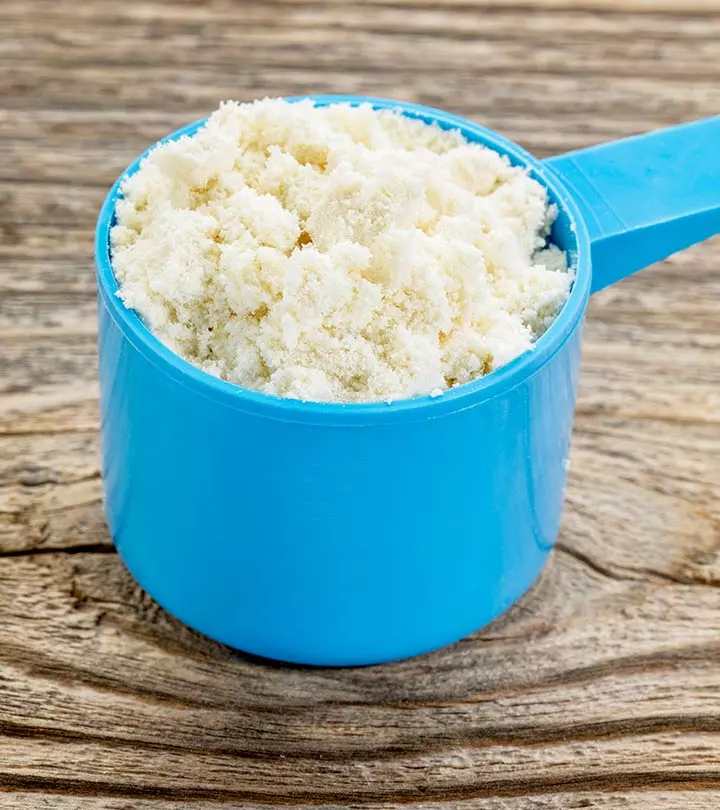Cod Liver Oil Benefits: 8 Proven Health Advantages
Demystify the science behind this liquid gold's health magic and unlock your inner glow.

Image: shutterstock
The vitamins A, D, and omega-3 fatty acids are responsible for the benefits of cod liver oil. This oil is derived from the codfish liver. It was being used for centuries to prevent the effects of vitamin D deficiency (rickets). Cod liver oil is known to improve rheumatoid arthritis symptoms, support eye health, and reduce the risk of heart disease. In this article, we further discuss the potential health benefits of cod liver oil, its nutrition, and any potential side effects. Read on to know more.
In This Article
Cod Liver Oil Nutrition Profile
Cod liver oil is a good source of vitamins A and D. 1 teaspoon (4.5 g) of cod liver oil contains (1):
- Calories: 40.6 kcal
- Fat: 4.5 g
- Omega-3 fatty acids: 888 mg
- Vitamin A: 4501 IU
- Vitamin D: 450 IU
 Did You Know?
Did You Know?Cod liver oil provides the daily requirement of vitamins A and D to your body. It also helps support your overall health. What are the potential health benefits of cod liver oil? Check them out in the following section.

Key Takeaways
- Cod liver oil is one of the most nutritious dietary supplements extracted from the liver of codfish.
- It is rich in essential nutrients such as vitamins A and D and omega-3 fatty acids that support your overall health.
- The possible benefits of cod liver oil include treating rheumatoid arthritis symptoms, improving eye health, and reducing the risk of heart disease.
Health Benefits Of Cod Liver Oil
1. May Help Improve Rheumatoid Arthritis Symptoms
Cod liver oil, a food high in omega-3, contains vitamins A and D, which can help reduce inflammation. Omega 3-fatty acids in cod liver oil reduce chronic inflammation by suppressing the proteins (TNF-α, IL-1, and IL-6) that promote swelling. The oil also contains vitamins A and D, powerful antioxidants which neutralize harmful free radicals and reduce inflammation. Research suggests that vitamin A deficiency may lead to inflammatory diseases (2), (3). Vitamin D deficiency may also lead to autoimmune disorders like rheumatoid arthritis (a chronic inflammatory disorder that can affect joints) (4).
People with inflammatory bowel disease also have joint pains. As per studies, the vitamin D and omega-3 fatty acids in cod liver oil may help reduce the symptoms of rheumatoid arthritis (5), (6). One pilot study conducted by the Institute for Phytopharmaceuticals, Berlin, on 43 patients with rheumatoid arthritis found that intake of 1 g of cod liver oil daily for three months may help reduce the symptoms (7).
Vitamin D levels also play a key role in bone development (8). It increases calcium absorption and promotes healthy bones. Adequate calcium intake reduces the risk of fractures and bone mineral loss in postmenopausal women (9).
2. May Support Eye Health
The omega-3 fatty acids and vitamin A in cod liver oil may help treat glaucoma, a leading cause of blindness. The omega fats could increase the blood flow to the eye and may prevent or treat glaucoma (10). As per studies, foods rich in eicosapentaenoic acid (EPA) and docosahexaenoic acid (DHA) (omega fatty acids) reduce the risk of age-related macular degeneration (AMD) (11). Dietary intake of long-chain polyunsaturated fatty acids, like omega fatty acids, was also found to lower the risk of age-related maculopathy (ARM) (an eye disease that causes incurable blindness ) (12).
3. May Reduce Risk Of Heart Disease
High consumption of foods rich in omega-3 fatty acids reduces the risk of coronary heart disease (CHD) and improves heart health (13). Research suggests that the unsaturated fats in cod liver oil may help reduce levels of total cholesterol and triglycerides. Omega-3 fats in cod liver oil increase HDL cholesterol (good) levels, which lowers the risk of heart disease. A study conducted by the University of Western Sydney found that fish oil can reduce triglyceride levels in people with hyperlipidemia (high levels of lipids in the blood) (14). High blood pressure is also one of the risk factors for CHD. Cod liver oil was found to be effective against high blood pressure (15). Dietary supplementation of cod liver oil was also found to prevent blockage (forming plaque) in arteries, which otherwise narrows the arteries and leads to heart attack and stroke (16).
4. May Improve Cognitive Performance
As per studies, daily intake of cod liver oil may help improve symptoms of anxiety and depression (17). The active agents in fish oils, such as eicosapentaenoic acid (EPA) and docosahexaenoic acid (DHA), could improve cognitive function in male Wistar rats (18). The vitamin D in cod liver oil may also play a role here. Some studies suggest that vitamin D deficiency may increase the risk of depression symptoms (19). However, more studies are warranted to further understand this benefit of cod liver oil.
5. May Help Heal Ulcers
In one study published in the Indian Journal of Pharmacology, cod liver oil could help heal gastric and duodenal ulcers in rats (20). Another rat study found that cod liver oil can reduce inflammation and ulcerations in the gut (20). However, more studies are needed to understand this benefit of cod liver oil in humans.
6. May Help Treat Diabetes
In a study conducted on 550 gestational diabetics (diagnosis of diabetes during pregnancy), the use of cod liver oil could reduce the levels of blood glucose and lipids (20). Cod liver oil consumption during pregnancy was also found to decrease the risk of diabetes type-1 in newborns (21). However, very little data is available on this effect of cod liver oil in humans.
7. May Promote Wound Healing
Cod liver oil could be effective in repairing wounds. In one study, topical application of cod liver oil could accelerate wound healing in the ears of hairless mice (22).
8. May Help Treat Acne
As per studies, cod liver oil is rich in vitamin A content, which may help treat acne (23). Vitamin A supports the immune system and aids in cellular growth, which may help improve skin conditions. When applied topically or consumed, it may improve skin conditions like acne vulgaris and keratosis pilaris (23). Moreover, cod liver oil is also rich in omega-3 fatty acids. Studies show that people who consume omega-3 fatty acids experience fewer cases of acne (24). The combined effects of vitamin A and omega-3s make cod liver oil a holistic option to promote skin health and manage acne symptoms.
These are the health benefits of cod liver oil. However, consuming the oil in the recommended dosage is key. We have discussed more in the next section.
Cod Liver Oil Supplements And Dosage
This fish oil supplement is primarily available in liquid or capsule form. There is no standard recommended dosage for cod liver oil intake. A dose of 1 to 2 teaspoons of the oil is generally regarded as safe for consumption. Excess vitamin A intake may lead to rashes and headaches. As most cod liver oil supplements also contain vitamin A, intake in higher doses is not recommended. Consult your doctor or health care provider for information on the dosage of cod liver oil.
A survey was conducted in 2025 with 1,415 Britons to ascertain the type of dietary supplements they had purchased in the six months prior to the survey. It revealed that 72% took vitamins, 23% took mineral supplements, 20% took proteins and amino acids, 20% took essential fatty acids such as cod liver oil, 19% preferred natural plant and fungi supplements, 17% relied on probiotics, and 4% took something else (undisclosed).
 Trivia
TriviaYou must consider a few factors if you are keen on purchasing cod liver oil supplements. Read on to know in detail.
What To Look For While Buying Cod Liver Oil Supplements
- Look for cod liver oil supplements in capsule or liquid forms. Avoid use if you find the capsules broken.
- Check for product labels for safety precautions and directions for use.
- Cod liver does not taste like oil. If you want to try cod liver itself, some brands sell it canned.
- Look for a recognized certification by organizations like NSF International or certification marks on the product labels. Go for cod liver oil from a reputed brand.
A hair and lifestyle blogger has reintroduced cod liver oil into her routine to address knee pain. She explains, “Another reason why I take Cod liver oil is because I don’t eat much fish in my diet, I’m a fussy eater and scared of bones even in boneless fish. I nearly choked on a little bone when I was younger. So I knew I had to take supplements to add it to my diet as I’m not in a hurry to eat fish any time soon (i).”
Cod liver oil is generally considered safe. But should you be wary of any risks?
Potential Risks Of Cod Liver Oil
Cod liver oil is generally considered healthy and safe for most people. But it may cause some serious side effects due to the presence of certain environmental toxins like dioxins, mercury, and polychlorinated biphenyls (25). People using blood-thinning medications like warfarin should avoid using cod liver oil as it may act as a blood thinner, and high doses may prevent blood clotting (26). Also, pregnant women should consult their doctor before using cod liver oil.
The benefits of cod liver oil can be attributed to its vitamin and omega-3 fatty acid content. Cod liver oil improves the symptoms of rheumatoid arthritis, promotes eye health, reduces the risk of cardiovascular diseases, improves cognitive performance, helps in healing ulcers, aids in the treatment of diabetes, and promotes wound healing. You can consume cod liver oil directly or take supplements if prescribed. However, it should be avoided by people on blood-thinning medications, as cod liver oil acts as a blood thinner. Including cod liver oil in your diet in moderation helps in reaping its benefits.
Frequently Asked Questions
Does cod liver oil make you sleepy?
Anecdotal evidence suggests that cod liver oil helps improve sleep quality. However, excess intake of this oil may cause insomnia. That said, limited data is available in this regard.
How long does cod liver oil take to work?
Cod liver take will start having a beneficial impact on your health within two to three weeks if you consume it every day.
Does cod liver oil make you look younger?
Yes. Cod liver oil helps improve skin pigmentation, and its omega-3 fats give your skin a youthful appearance (27).
Can you take multivitamins and cod liver oil together?
No. Cod liver oil naturally contains vitamins A and D, so taking it along with multivitamins may overdose these intakes. However, limited data is available in this regard.
Does cod liver oil make you poop?
Anecdotal evidence suggests that cod liver oil may make you poop. That said, high doses of cod liver oil cause loose stools.
Cod liver oil offers various health advantages, such as supporting heart health, immune function, and bone strength. Learn from this video why cod liver oil is a valuable addition to your diet and how it differs from traditional fish oil. Check out below now.
Personal Experience: Source
StyleCraze's articles are interwoven with authentic personal narratives that provide depth and resonance to our content. Below are the sources of the personal accounts referenced in this article.
(i) WHAT ARE THE BENEFITS OF TAKING COD LIVER OIL?https://missybeelondon.wordpress.com/2025/03/10/what-are-the-benefits-of-taking-cod-liver-oil/
References
Articles on StyleCraze are backed by verified information from peer-reviewed and academic research papers, reputed organizations, research institutions, and medical associations to ensure accuracy and relevance. Read our editorial policy to learn more.
- Fish oil cod liver
https://fdc.nal.usda.gov/fdc-app.html#/food-details/173577/nutrients - Vitamin A as an anti-inflammatory agent
https://pubmed.ncbi.nlm.nih.gov/12230799/ - Inflammation and vitamin D: the infection connection
https://www.ncbi.nlm.nih.gov/pmc/articles/PMC4160567/ - Vitamin D and inflammatory diseases
https://www.ncbi.nlm.nih.gov/pmc/articles/PMC4070857/ - Effects of high-dose fish oil on rheumatoid arthritis after stopping nonsteroidal antiinflammatory drugs. Clinical and immune correlates
https://pubmed.ncbi.nlm.nih.gov/7639807/ - Cod liver oil (n-3 fatty acids) as an non-steroidal anti-inflammatory drug sparing agent in rheumatoid arthritis
https://pubmed.ncbi.nlm.nih.gov/18362100/ - Effect of cod liver oil on symptoms of rheumatoid arthritis
https://pubmed.ncbi.nlm.nih.gov/12069368/ - Vitamin D and bone health
https://pubmed.ncbi.nlm.nih.gov/8642450/ - The role of dietary calcium in bone health
https://pubmed.ncbi.nlm.nih.gov/15018485/ - Cod liver oil: a potential protective supplement for human glaucoma
https://www.ncbi.nlm.nih.gov/pmc/articles/PMC3340802/ - Dietary Intakes of Eicosapentaenoic Acid and Docosahexaenoic Acid and Risk of Age-Related Macular Degeneration
https://pubmed.ncbi.nlm.nih.gov/28153441/ - Dietary omega-3 fatty acids and the risk for age-related maculopathy: the Alienor Study
https://pubmed.ncbi.nlm.nih.gov/21705687/ - The effects of the intake of cod liver oil on the blood lipid level the lipoprotein profile and bleeding time
https://pubmed.ncbi.nlm.nih.gov/2718528/ - Benefits of fish oil supplementation in hyperlipidemia: a systematic review and meta-analysis
https://pubmed.ncbi.nlm.nih.gov/18774613/ - The use of dietary supplements and their association with blood pressure in a large Midwestern cohort
https://www.researchgate.net/publication/258956872_The_use_of_dietary_supplements_and_their_association_with_blood_pressure_in_a_large_Midwestern_cohort - Dietary cod-liver oil improves endothelium-dependent responses in hypercholesterolemic and atherosclerotic porcine coronary arteries
https://pubmed.ncbi.nlm.nih.gov/3191596/ - Associations between cod liver oil use and symptoms of depression: the Hordaland Health Study
https://pubmed.ncbi.nlm.nih.gov/17184843/ - Long-term administration of cod liver oil ameliorates cognitive impairment induced by chronic stress in rats
https://pubmed.ncbi.nlm.nih.gov/21442272/ - Vitamin D deficiency and depression in adults: systematic review and meta-analysis
https://pubmed.ncbi.nlm.nih.gov/23377209/ - Cod-Liver Oil Improves Metabolic Indices and hs-CRP Levels in Gestational Diabetes Mellitus Patients: A Double-Blind Randomized Controlled Trial
https://pubmed.ncbi.nlm.nih.gov/31956660/ - Use of cod liver oil during pregnancy associated with lower risk of Type I diabetes in the offspring
https://pubmed.ncbi.nlm.nih.gov/11043854/ - TOPICAL APPLICATION OF COD LIVER OIL OINTMENT ACCELERATES WOUND HEALING: AN EXPERIMENTAL STUDY IN WOUNDS IN THE EARS OF HAIRLESS MICE
https://www.tandfonline.com/doi/abs/10.1080/02844310050160123 - Mother was right about cod liver oil
https://www.ncbi.nlm.nih.gov/pmc/articles/PMC2258476/ - Effects of fish oil supplementation on inflammatory acne
https://www.ncbi.nlm.nih.gov/pmc/articles/PMC3543297/ - Safety considerations with omega-3 fatty acid therapy
https://pubmed.ncbi.nlm.nih.gov/17368277/ - Mother Was Right About Cod Liver Oil
https://www.ncbi.nlm.nih.gov/pmc/articles/PMC2258476/ - Omega-3: from cod-liver oil to nutrigenomics
https://pubmed.ncbi.nlm.nih.gov/18511896/
Read full bio of Silky Mahajan
Read full bio of Sindhu Koganti
Read full bio of Arshiya Syeda
Read full bio of Himanshi Mahajan



























Community Experiences
Join the conversation and become a part of our empowering community! Share your stories, experiences, and insights to connect with other beauty, lifestyle, and health enthusiasts.